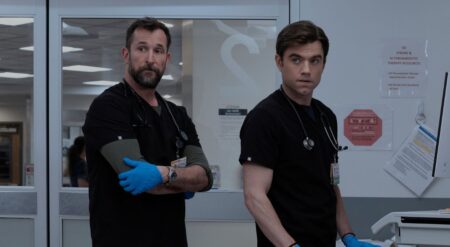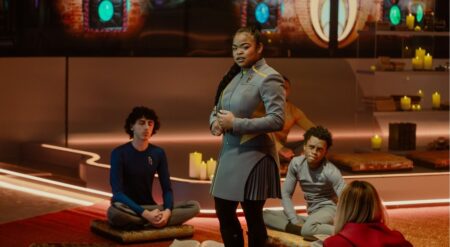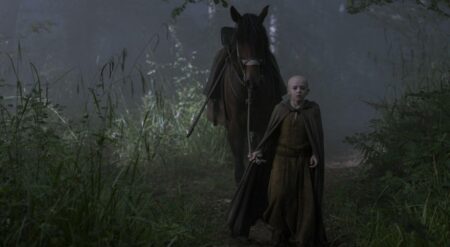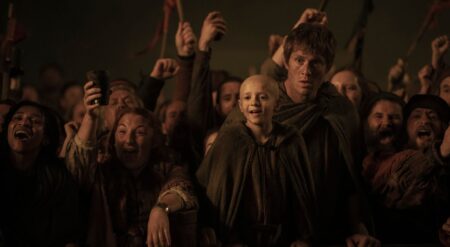Marked (Marcada) is a crime drama directed by Thabani Gigaba, Katlego Mokoena, Desiree Muli, and Freddie Van’Dango and written by Sydney Dire. Babalwa (Lerato Mvelase) is a former cop working for a security company that is barely making ends meet. Her daughter needs an expensive surgery to remove a cancerous tumor from her head, and all her husband wants to do to cure it is pray.
While also god-fearing, Babalwa is not prepared to sit back and see how things play out. When all other avenues are exhausted, she turns to a local gangster to set up a heist against her employer so she can acquire the money needed to save her daughter’s life.
Stories about desperate people pushed to the point of doing bad things aren’t new. As more and more people feel the pressure of financial burdens looming over them, it has become a more relatable topic than ever. “How far would you go?” is a compelling question, especially when a narrative can blend nuance, complexity, and emotional turmoil into its exploration of the concept, which is exactly what Marked (2025) does.
Marked (2025) knows how far and how fast to push Babalwa into the dark side of life perfectly. The incremental slide deeper into criminal activity makes her descent feel believable in a way many such stories fail to deliver. Babalwa’s determination to only go as far as she must, and her desperate attempts to control the slowly spiraling situation, solidify her determination to be good, even as she slips into worse situations, accepting what must be done.
Marked (2025) is unafraid to push its protagonist into the dark side to highlight how far a person will go.

Mvelase does a great job of portraying the restrained Babalwa. Though frequently soft-spoken, Babalwa is capable of projecting a great deal of command over a scene, which Mvelase is exemplary at bringing to life. Every time she states she will do anything to save her daughter, you believe it.
While Babalwa’s struggle with moral compromise takes center stage in Marked (2025), her’s isn’t the only tale of woe that helps create the circumstances for her plan to come together. The series’ expansion of the economic realities plaguing its world beyond its lead emphasizes that this isn’t an isolated incident; it is an endemic problem.
Despite getting far less time to flesh out their circumstances, the side characters each bring a believable story with them. Whether their struggles are brought about through circumstance or their own doing, these characters create a strong ensemble to further support the series’ central themes as it enters the back half of its six-episode run.
But perhaps the most interesting character next to Babalwa herself when it comes to the series’ themes is her extremely religious husband, Lungile (Bonko Khoza, The Brave Ones). Lungile is the polar opposite of Babalwa. As the situation with their daughter grows more dire, he doubles down on faith rather than action. He believes god will save their daughter if they simply pray and show their ardent devotion enough.
The duality of man stands centerstage, as we watch different characters battle between what’s right and wrong.

The pair’s widely different approaches set them at odds, even when Lugile doesn’t know the full extent of his wife’s activities. His unwillingness to do anything that may ruffle the feathers of the local church or God is immensely frustrating. However, thanks to Khoza’s excellent performance, he manages to draw out more sympathy than one might expect.
Khoza’s portrayal of Lugile drives home a simple fact: the man is paralyzed by fear. He sees something incredibly important to him slipping away, and in his terror, he shrinks into the only safety he knows, his faith. Despite this being a far from optimum reaction, it’s understandable. Whenever we feel overwhelmed, it is natural to run to a place of safety. Unlike his wife, he’s just never able to fully compel himself to accept that he must step outside his safe space if he wishes to truly combat the problem looming over his family.
The duality of outlook between husband and wife plays perfectly into Marked’s incredible ending. The final scenes are precisely implemented so that it will look like one side of the argument was right to the characters, while the godlike view permitted to the audience allows for a different conclusion to be drawn. This play with perception highlights how numerous small events and interactions can cause outcomes that never would have been, and without the “god’s eye view” of narrative storytelling, could seem miraculous.
Marked (2025) delivers an impactful and intricate story about finding out what you are willing to do for those you love. How it weaves its narrative together and blends it with challenging moral dilemmas creates a series that explores a familiar concept in a way few of its contemporaries manage to equal.
Marked (2025) is streaming now on Netflix.
Marked (2025)
-
Rating - 9/109/10
TL;DR
Marked (2025) delivers an impactful and intricate story about finding out what you are willing to do for those you love.







